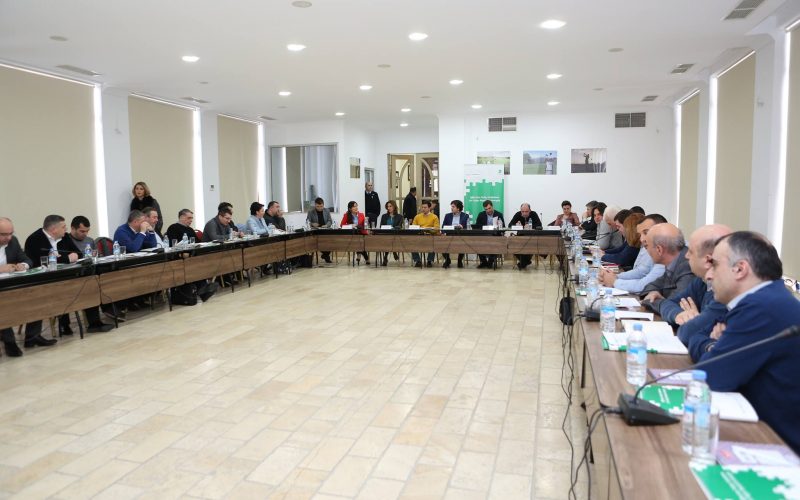On February 11th the Georgian Alliance for Safe Roads (GASR) organized a high-level round-table meeting under the project “Effective Solutions for Safer Roads in Georgia” supported by EWMI ACCESS. The meeting brought together representatives of Georgian CSOs, heads of the parliamentary committees, MPs from the ruling party and the Speaker of the Parliament, Deputy Minister of Interior, Vice Mayor of Tbilisi and others.
 Speaking of the amendments to the law on road traffic submitted to the Parliament in 2015 and advocated by GASR and other partner CSOs, the Speaker of the Parliament Irakli Kobakhidze and Majority Leader Archil Talakvadze stated that the Parliament is ready to pass the new law during this Spring Session. They said that thanks to the recent awareness-raising campaign, public opinion was now largely supportive of government intervention to reduce casualties and road accidents in Georgia. The government of Georgia was also strongly supporting the amendments. The Parliament plans to move fast to finalizing the discussion and making bold and effective decisions.
Speaking of the amendments to the law on road traffic submitted to the Parliament in 2015 and advocated by GASR and other partner CSOs, the Speaker of the Parliament Irakli Kobakhidze and Majority Leader Archil Talakvadze stated that the Parliament is ready to pass the new law during this Spring Session. They said that thanks to the recent awareness-raising campaign, public opinion was now largely supportive of government intervention to reduce casualties and road accidents in Georgia. The government of Georgia was also strongly supporting the amendments. The Parliament plans to move fast to finalizing the discussion and making bold and effective decisions.
In response to “top killers” such as over-speeding, drunk-driving, illegal maneuver etc., GASR experts shared their policy paper recommendations prepared through ACCESS funding on the best model of penalty points, invisible/mobile cameras and unmarked traffic patrol (so called “contactless patrolling”) envisaged under the draft law.
Deputy Minister of Internal Affairs (MIA) underlined readiness to get the feedback from various stakeholders and shape the draft law accordingly. MIA has already removed the oft-criticized clause on banning registration of the right-wheel cars since this issue has already been dealt with by raising customs fees for such cars. MIA agreed that introducing penalty points and unmarked traffic police would have positive effect on those drivers who do not take fines seriously or drive recklessly in absence of the patrol police. However, MIA is ready to address main concern of the leading CSOs regarding the potential violation of privacy through introducing the so called “contactless patrolling”. The government agreed to follow international best practices and either mark the routes of undercover traffic police cars or put smaller but identifiable marks on such cars. It also expressed its readiness to work closely with the Personal Data Inspector to safeguard from misuse.
Besides, CSOs, MPs and MIA agreed that sanctions must become stricter for drunk-driving and those drivers who drive without driving license, possible introduction of the mandatory driving exams before a driving license can be retrieved, etc. Prior to legalizing and enacting these changes, MIA will carry out a targeted information campaign to explain the changes and ‘pre-warn’ drivers.
Chairperson of the Legal Issues Committee suggested organizing a working meeting between MIA, CSOs and lawyers of the Committee to make last fine-tuning of the draft law. The working group meeting is expected to take place within the coming week.



















